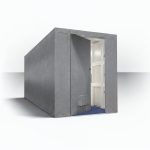Polyurea coatings are revolutionizing the protective coatings industry with their superior performance characteristics and versatile applications. This advanced technology offers unparalleled durability, flexibility, and rapid curing times, making it a preferred choice for a wide range of industries, including construction, automotive, and marine sectors.
What is Polyurea?
Polyurea is an elastomer derived from the reaction of an isocyanate component and a synthetic resin blend component through step-growth polymerization. The resulting material is incredibly resilient, including high tensile strength, chemical resistance, and exceptional elongation. These attributes make polyurea ideal for protective coatings and linings in various demanding environments.
Key Benefits of Polyurea Coatings
- Rapid Curing and Installation: Polyurea coatings cure in seconds, allowing for faster project completion and minimal downtime. This rapid curing time is particularly beneficial in environments where speed is crucial, such as industrial settings and high-traffic areas.
- Exceptional Durability: Polyurea provides excellent resistance to abrasion, impact, and chemical exposure, significantly extending the lifespan of the coated substrate. This makes it suitable for applications where heavy wear and tear are expected.
- Versatility: Polyurea can be applied to various substrates, including concrete, steel, and wood. Its flexibility allows it to bridge cracks and accommodate substrate movements, which is essential for structures exposed to varying temperatures and loads.
Unique Insights and Statistics
- Enhanced Weather Resistance: Research from the Journal of Coatings Technology and Research indicates that polyurea coatings can withstand extreme weather conditions, including UV exposure and temperature fluctuations ranging from -40°F to 350°F, without degrading. This resilience makes polyurea an ideal choice for outdoor applications and harsh environments.
- Economic Efficiency: A study by Frost & Sullivan estimates that the global market for polyurea coatings will reach $1.48 billion by 2025, driven by the increasing demand for high-performance coatings in infrastructure and automotive sectors. This growth underscores the economic viability and industry acceptance of polyurea as a premium protective coating.
- Sustainability Benefits: According to the Green Building Council, polyurea coatings contribute to sustainable building practices by extending the life of structures and reducing the need for frequent maintenance and replacements. Additionally, advancements in polyurea formulations have led to the development of eco-friendly versions with low volatile organic compounds (VOCs).
Applications of Polyurea Coatings
- Roofing: Polyurea coatings are extensively used in roofing systems for their waterproofing and UV-resistant properties. They provide a seamless, monolithic membrane that protects against leaks and weather damage.
- Industrial Flooring: In industrial settings, polyurea coatings offer superior resistance to chemicals, abrasion, and heavy loads. They create durable, easy-to-clean surfaces ideal for warehouses, factories, and processing plants.
- Waterproofing: Polyurea’s waterproofing capabilities make it suitable for various applications, including water tanks, reservoirs, and marine vessels. Its ability to create a continuous, flexible barrier prevents water ingress and corrosion.
- Protective Linings: Used in secondary containment areas, polyurea provides an extra layer of protection against spills and leaks of hazardous materials. This application is critical in the petrochemical and environmental sectors.
Innovations in Polyurea Technology
Recent advancements in polyurea technology have led to the development of specialized formulations designed to address specific industry needs. For example:
- High-Temperature Polyurea: Formulations that withstand prolonged exposure to high temperatures without losing performance.
- Antimicrobial Polyurea: Coatings that inhibit the growth of bacteria and fungi, making them ideal for healthcare and food processing environments.
- Spray-On Polyurea: Innovations in spray equipment have made it possible to apply polyurea coatings more efficiently, even in complex geometries and hard-to-reach areas.
Conclusion
Polyurea coatings significantly advance protective coating technology, offering unmatched durability, flexibility, and rapid curing times. Their ability to perform under extreme conditions and in diverse applications makes them a valuable investment for industries seeking long-lasting protection and enhanced performance. As technology continues to evolve, the future of polyurea coatings looks promising, with ongoing innovations expanding their potential and applications.
Embracing polyurea coatings can improve infrastructure longevity, reduce maintenance costs, and enhance sustainability, making them a cornerstone of modern protective solutions. If you would like to learn more about polyurea, click here.







6 thoughts on “Polyurea Coating: The Complete Guide”
Pingback: Shaping Tomorrow: A Glimpse into the Future of the Polyurea Industry - American Polyurea
Pingback: The Evolution of Polyurea: A Revolutionary Coating Solution - American Polyurea
Pingback: The Benefits of Joining American Polyurea: How Becoming a Member Could Drive Growth for Your Coatings Company - American Polyurea
Pingback: Where to Buy Polyurea – The Ultimate Guide - American Polyurea
Pingback: Spray On Protective Polyurea Coatings VS Epoxy Roll On Coatings: Why Polyurea Will Always Be Best - American Polyurea
Pingback: The Global Polyurea Market and Outlook: A Comprehensive Analysis - American Polyurea